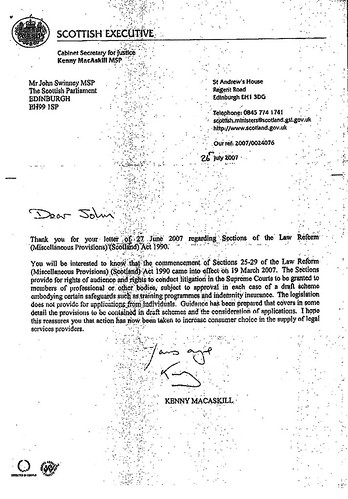A leaked letter discussing the implementation of Sections 25-29 of the Law Reform (Misc Provisions) (Scotland) Act 1990, where 17 year old legislation had only just been implemented in Scotland in early 2007, was intended to mislead both MSPs, a cabinet colleague, and parliament, according to campaigners for wider access to legal services.
In the leaked letter, Mr MacAskill implies all is well with the implementation of Sections 25-29 and that applicants for practicing certificates are able to apply for rights of representation without problem.
The text of the leaked letter, courtesy of Peter Cherbi :
You [John Swinney] will be interested to know that the commencement of Sections 25-29 of the Law Reform (Miscellaneous Provisions) (Scotland) Act 1990 came into effect on 19 March 2007. The Sections provide for rights of audience and rights to conduct litigation in the Supreme Courts to be granted to members of professional or other bodies, subject to approval in each case of a draft scheme embodying certain safeguards such as training programmes and indemnity insurance. The legislation does not provide for applications from individuals. Guidance has been prepared that covers in some detail the provisions to be contained in draft schemes and the consideration of applications. I hope this reassures you that action has now been taken to increase consumer voice in the supply of legal service providers.
Notably, there have been several applications under Sections 25-29 for rights of representation since March 2007, all of which have been rejected by the Lord President and Mr MacAskill since he took office as Justice Secretary.
Sources inform Scottish Law Reporter the reason the applications have been rejected is because the applicants are not part of the Master Insurance Policy of the Law Society of Scotland, and Mr MacAskill is being pushed not to allow a successful application unless the Law Society give permission.
It should be pointed out that both the Lord President, and Mr MacAskill, who must agree such applications, are both members of the Law Society of Scotland, and have at some stage in their careers paid into the Master Insurance Policy of the Law Society, which directly benefits from maintaining a closed shop monopoly on legal services.
So much for an independent Scottish government .. and how about that contradictory letter to Cabinet Secretary for Business John Swinney where clearly misleading statements have been made ...
The Herald reports.
Scots Government has ‘no appetite’ for legal change
IAN FRASER
Scotland's government and legal establishment has been accused of continuing to drag its heels on reforms intended to open up the justice system and reduce the costs of litigation.
Sections 25-29 of the Law Reform (Miscellaneous Provisions) (Scotland) Act 1990 were intended to end the country's legal closed shop by allowing people other than advocates and lawyers to have rights of audience in Scottish courts.
However the four sections of the 1990 act were dormant on the statute book for 17 years. They were finally implemented in Scotland by Jack McConnell's government on March 19. However, nine months on, no professional bodies have secured rights of audience for members.
The rights, which ended the legal closed shop in England and Wales in 1997, can be granted to professional organisations but not to individuals. The Scottish Government is insisting that, in order to qualify, any professional body must prove it has certain "safeguards" in place, including codes of conduct, training programmes and indemnity insurance.
Campaigners for access to justice suspect the Scottish government's failure to act on the reforms is because neither the justice secretary Kenny MacAskill nor the Lord President - who together must approve each and every application - have the appetite for change. The Association of Commercial Attorneys, whose 20 members specialise in handling construction industry disputes, applied for rights of audience in Sheriff courts on June 29. Last month, the body was disappointed to receive a letter from the Lord President, Lord Hamilton suggesting it was insufficiently well-established to be able to properly regulate its own members and therefore that it would probably find itself ineligible for rights of audience.
David Whitton, Labour MSP for Strathkelvin and Bearsden, believes this is pure protectionism. He challenged MacAskill on this during a recent debate on the legal services in the parliament, and has sent three subsequent written questions on the matter. During the debate, Whitton asked MacAskill why the rights had not yet been granted to anyone. Whitton said: "I urge the cabinet secretary to put aside his earlier prejudice and give the people of Scotland the affordable choices that currently are enjoyed in the rest of the UK."
However MacAskill said he was "not convinced" that sections 25-29 would be of any benefit, and that he had not changed his views on the matter since writing an article in the Scotsman in February 2006. In this MacAskill said he had "yet to be convinced that the move would benefit the legal service, rather than make the situation worse There are good reasons for having a monopoly-regulated profession; otherwise, how do you regulate those not part of the organisation?"
MacAskill's public hostility to change appears to contradict what he said in a leaked letter to cabinet colleague John Swinney. In this, MacAskill said: "You will be interested to know that the commencement of the sections came in to effect on 19 March 2007 Guidance has been prepared that covers in some detail the provisions to be contained in draft schemes and the consideration of applications. I hope this reassures you that action has now been taken to increase consumer choice in the supply of legal service providers."
A spokesman for ACA said: "We are concerned that the cabinet secretary for justice - who has an involvement in the consideration of our application - has formed a view without putting forward any evidence to substantiate how he has arrived at his position.

No comments:
Post a Comment